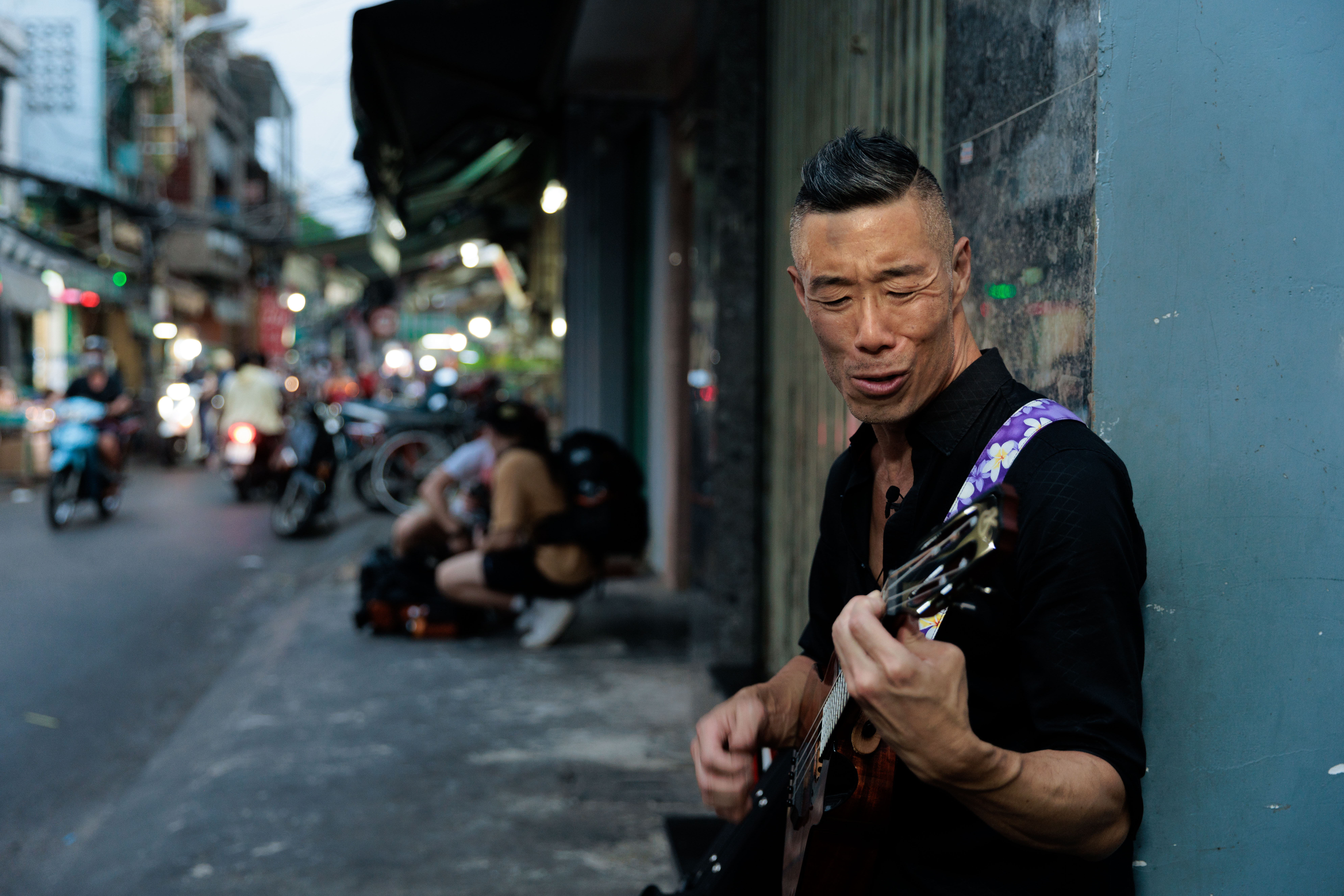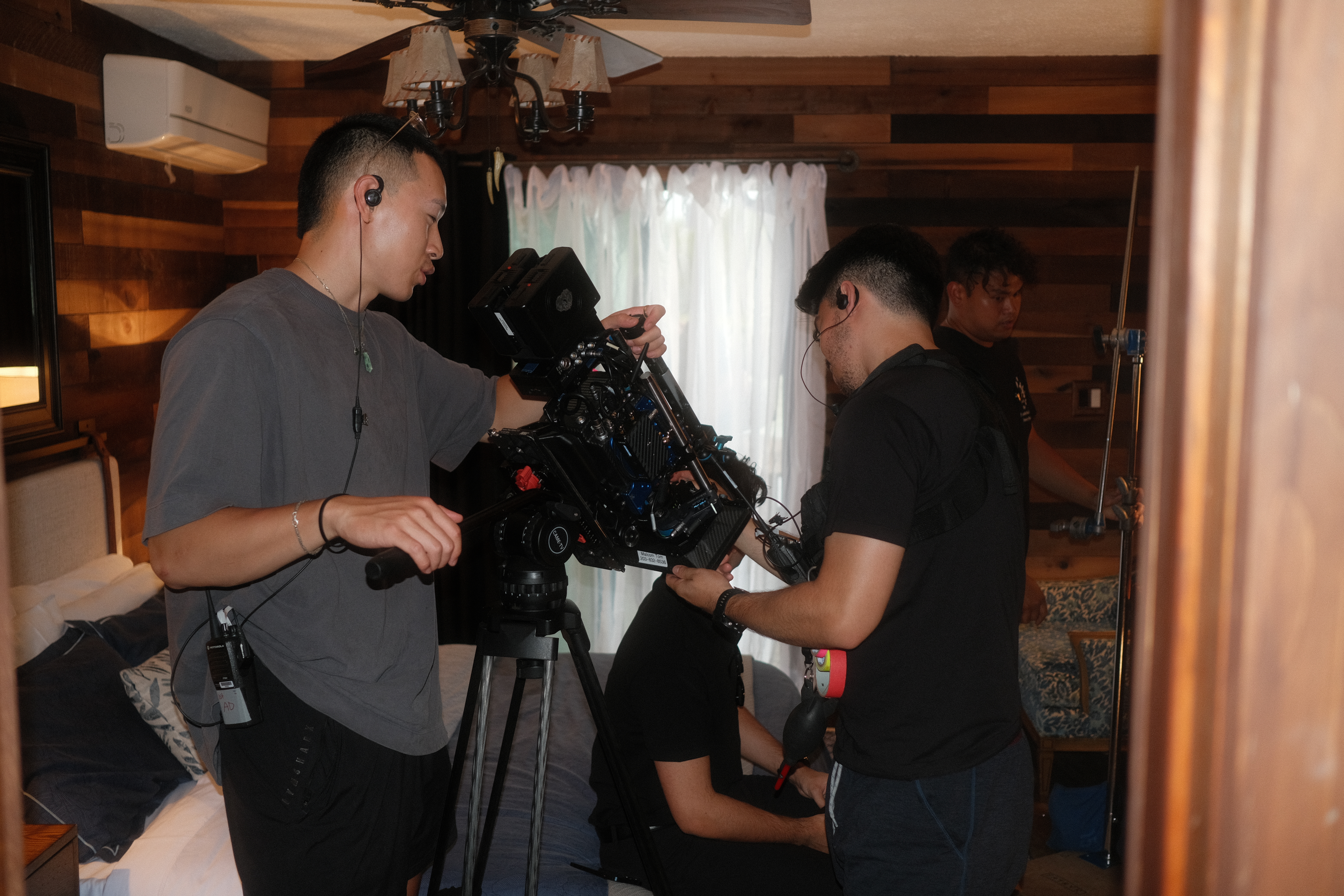Learning on the Fly
Joshua Pei and a team of BU alums are traveling the globe to tell great documentary stories
Joshua Pei and a team of BU alums are traveling the globe to tell great documentary stories
Joshua Pei chose his major, computer science, for the practical reason that it offered a clear career path. He chose his minor, deaf studies, for the altruistic reason that he “wanted to understand a minority community that is very overlooked.” But he chose his campus job, production assistant for BU Productions, for a more personal reason: He loves video.
Pei (CAS’21) began shooting video in high school for the YouTube creators he followed. While working for BU Productions, the University’s in-house video production team, he helped document the ways that college life changed during the COVID pandemic. He produced one video about campus tours going virtual and another about college social lives during COVID. He also hosted a video about anti-Asian racism.

“Seeing how documentary filmmaking is done, I really fell in love with the process,” Pei says. He began to rethink computer science as a profession. “What makes you passionate about each day and each project?” Pei remembers asking himself. “If this feels right, why don’t I just chase it?”
Less than four years later, Pei is the cofounder of a production company and an award-winning director, and he’s producing a film that has taken him to one of the most remote, rugged landscapes in the world. “Chasing what you want to do is becoming scarier and scarier in the modern day,” he says. “But if you have the fire in your heart to tell a story, it’s going to drive you.”
Aiming for the Clouds
Pei didn’t have to look far to find like minds interested in telling great stories. He worked with Aaron Hwang (ENG’21) at BU Productions, and the two partnered with Jacob Chang-Rascle (COM’22) to form the production company 4th District. The name refers to the area of Ho Chi Minh City, Vietnam, where they collaborated on their first documentary film, Song of Earthroot. The company offers commercial and documentary film production, aerial photography and videography, and postproduction services.
So far, 4th District’s clients have included BU Student Health Services, a luxury watch retailer, and a professional basketball player’s foundation—but the partners wanted to find an ambitious documentary story to tell as well. Chang-Rascle had a bold idea: Paraglider Antoine Girard, who holds the world record for highest paragliding altitude at 8,407 meters, was planning an attempt to paraglide over K2, the world’s second highest peak. They reached out and Girard invited the young filmmakers to visit his home in France.

Following Girard’s story would be a massive challenge. K2 stands 8,611 meters above sea level on the remote Pakistan-China border (Mount Everest is slightly higher, at 8,849 meters). Getting there involves visas, military escorts, acclimating to high altitude, and days of trekking. When the team made their first trip to the region in July 2024, they flew into Islamabad, drove 12 north to Hunza Valley where they met up with Girard and his team, as well as a larger community of extreme sports athletes and adventure filmmakers who congregate there. After filming interviews for several days, they drove another 15 hours to Skardu, then trekked for a week up to the K2 basecamp. Everyone on the production team got sick from the altitude, food, water, or a combination of the three. Pei lost 17 pounds.
Paragliding is both a daredevil pursuit and incredibly serene, a paradox evident in the first trailer for their film. The equipment is simple—a pilot is suspended by a harness from a “wing,” which looks like a parachute with the rounded edges trimmed off. To take off, a paraglider often runs and leaps from a cliff (a more accessible version of this pursuit involves being towed behind a boat). An expert like Girard can ride the air currents, called thermal updrafts, to rise and descend.
To film elite paragliders involves a delicate balance of technology and safety. On their trip to France, the team experimented with multiple camera styles and placements to be able to record Girard’s flights in Pakistan. Chang-Rascle learned how to operate an FPV drone—FPV stands for first person view and means that the operator is viewing the drone’s flight through special goggles. To fly in the harsh conditions of Pakistan’s mountains, at the altitudes where Girard soars, they had to custom build a drone with 3D-printed parts. They traveled with a special soldering kit for backcountry repairs.
Lighter Than Air—the film’s working title—promises to have many layers. Beyond the drama of humans soaring silently over snow-capped mountains, there’s a humanitarian angle. Girard, who has traveled many times to Pakistan, donates paragliding equipment to the communities he visits. “He gives so much to the places and the people he encounters,” Pei says. On their 2024 trip, Pei and his colleagues filmed Girard teaching Pakistanis to paraglide.
The film will also involve tragedy. Mountain climber and paraglider Rodrigo Raineri died in a crash during that 2024 expedition. Girard cut the trip short before attempting his record flight. It was a worst-case scenario that Pei and his colleagues knew they might encounter by covering an extreme sport like paragliding.
Before production began, they had discussed the risks of the project with representatives from Little Monster Films, the company that produced Free Solo, the Oscar-winning 2018 documentary about rock climber Alex Honnold ascending 900-meter El Capitan without ropes. The crews from both projects shared the same fear: How do you document a dangerous activity without inadvertently—perhaps tragically—influencing the outcome?
“We’re there to help tell the story and show the knife’s edge of what humans can do, but we also need to not bump that edge,” Pei says.
Taking the Leap
The technical and physical challenges of telling Girard’s story appealed to Pei and his partners. “If we could handle this, we could handle anything,” he says. But before they began that project, they had already proven they could handle an emotionally challenging film.

Pei had met Kính T. Vũ, an assistant professor of music at the College of Fine Arts, while he was at BU. In 2021 Vũ, who is gay and was born in Vietnam and adopted by an American family as an infant, began discussing an idea with Pei: a documentary film about Vũ’s displacement from and journey to reconnect with his native country. “I was honored that he trusted me with this,” Pei says. “But it was also a big leap.”
Pei, Hwang, and Chang-Rascle filmed on location in Boston and multiple sites in Vietnam as Vũ investigated and reflected on his past, from Operation Babylift—a mass evacuation of children at the end of the Vietnam War—to, in his words, “being raised as a white person.” The film is a touching, and often heart-wrenching, look at someone who desperately wants to find roots in his homeland.
The team completed Song of Earthroot in early 2023 and hosted a screening at BU. Pei and Hwang received a Best First Time Director award at the March 2024 New York International Film Festival, and the film was part of Boston’s Social Impact Film Festival. They’ve also found ways to share the film with Asian, adoptee, and queer communities. “As much as we love to just make art, ultimately the goal is to tell a story that can change people’s lives, move the needle,” he says. As they work on Lighter Than Air, they continue to look for ways to distribute their first film more broadly.
Where Girard’s story will end, nobody yet knows. Pei says they’re planning trips to film him in action in Italy and again in Pakistan where, they hope, he’ll become the first person to paraglide over K2. “We know the dangers of what he’s trying to do. We know the risks to him and to ourselves,” says Pei. “The stakes are so high, but it’s such a beautiful story.”
Top image: Joshua Pei’s passion for documentary filmmaking has taken him to Vietnam and Pakistan. Photo courtesy of 4th District